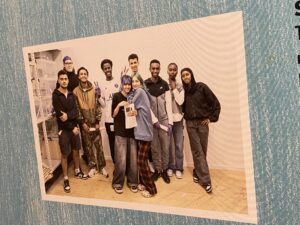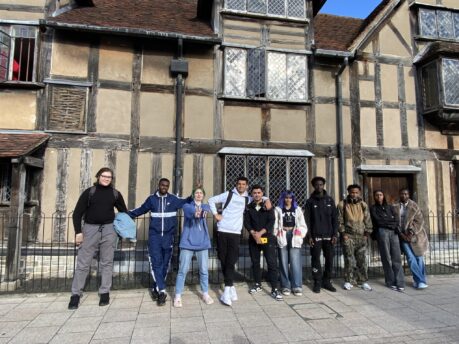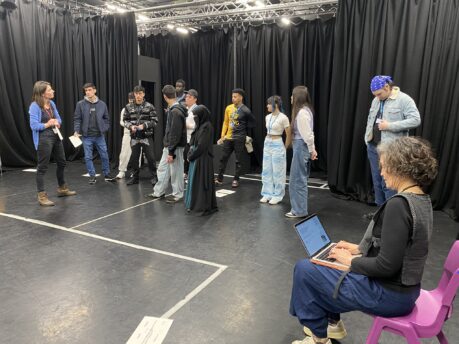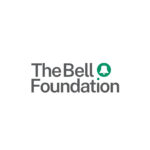In Conversation with Beacon Award Winner, Bradford College: “Shakespeare transforms students’ lives and gives them confidence”
In this blog, Ummera Iqbal and Esther Wilkey from Bradford College reflect on the college being named the winner of the Beacon Excellence in ESOL award, in recognition of its innovative use of Shakespeare and drama techniques to engage ESOL learners and promote confidence.
 Bradford College was named the winner of the 2025 AoC The Bell Foundation Excellence in ESOL Award, in recognition of its innovative use of Shakespeare and drama techniques to engage ESOL learners, helping to remove the usual cognitive overload and promoting confidence.
Bradford College was named the winner of the 2025 AoC The Bell Foundation Excellence in ESOL Award, in recognition of its innovative use of Shakespeare and drama techniques to engage ESOL learners, helping to remove the usual cognitive overload and promoting confidence.
Ummera Iqbal, Curriculum Area Manager, and Esther Wilkey, ESOL Lecturer, reflect on the successes and impact of the programme on learners’ self-belief, English learning, and personal development.
Esther: Ummera, it’s very exciting that our work has been recognised by this award. What would you say is our college’s main priority as a learning provider of ESOL?
Ummera: A lot of our students come to us not really knowing what they are capable of. Our job is to prepare students to build a future that they're proud of and to achieve their goals – whether that’s going into further education or the workforce. We’re here to help them find their confidence, learn new skills, and feel like they belong in their new community.
Esther: Yes – it’s important that learners see themselves as part of a community and that the community recognises their potential as well.
Ummera: For many of our ESOL learners, learning a new language is certainly one of the biggest challenges they face.
Esther: I would agree. Some of our learners have never had any formal education in their own language, so learning to read and write in a new language can be an even bigger challenge.
Ummera: Attending the college isn't just about getting an education though. It is about building that confidence to feel safe enough to speak up and ask for help. It’s about figuring out how to live in a whole new country: familiarising yourself with a completely new culture, a new language, and an unknown education system.

It’s important that learners see themselves as part of a community and that the community recognises their potential as well.
Ummwera: So Esther, how do you think the Shakespeare work has helped us to adapt our ESOL programme to meet the needs of our students?
Esther: We're the only college in the UK to use Shakespeare as part of our curriculum with ESOL students. Seven years ago, I took our ESOL students to a Shakespeare workshop, and was impressed with how interactive it was. It wasn’t just about learning Shakespeare – it was about building a sense of company, learning new words, and building confidence. The students loved it so much that they asked to do it again so it became part of our weekly lesson schedule, and a few years later we rolled it out to all our learners on the 16-19 ESOL programme.
In our Royal Shakespeare Company (RSC) lessons, we use rehearsal room technique, adopting the RSC pedagogy to build a sense of company and community within the class so that students feel a sense of belonging and recognise that each has a unique and valuable role to play in the lesson.
As a warmup, we play games where learners have to use eye contact with one another, which for some of them is a really big thing and is the first step to improving self-confidence. Other activities enable them to talk about where they come from, helping to build that sense of belonging and understanding of each other. There are always elements of Shakespeare’s stories that students can relate to when thinking about their own life experiences.
The more confident students are in lessons, the more the classroom becomes a relaxing, safe space where they can engage and feel that they can make mistakes.

We use rehearsal room technique, adopting the RSC pedagogy to build a sense of company and community within the class so that students feel a sense of belonging and recognise that each has a unique and valuable role to play in the lesson.
Esther: It's really exciting because it does transform lives and gives students confidence. The students are testimony to its success, especially those who are able to stand up and perform Shakespeare at the end of the academic year, whether they're in the Entry 1 or Level 1 course.
Ummera: Yes, it’s been amazing to see. And alongside the increase in retention and engagement, around 90% of our ESOL learners progress onto high level study, including GCSEs and university. Esther, what have been some of your highlights?
Esther: Learners tell us time and time again that it's because of what they have learned, and the self-belief gained through Shakespeare which has helped them to take the next step and be confident that they can do anything. Some of our students have gone on to become qualified doctors and nurses, while others have opened their own business, and one of our learners has secured acting and directing roles at the RSC theatre in Stratford-upon-Avon thanks to studying Shakespeare with us; some have even been invited to Downing Street to showcase their experiences.
Ummera: And what is a nugget of wisdom from the experience that you would share with others teaching ESOL, Esther?
Don’t be scared to step away from traditional teaching methods. Allow students to lead the class, because that's what will happen when they are given the opportunity to do so. If students are encouraged to express themselves in the way they want to, the language will come naturally.
Esther: So, what’s next on the agenda for our ESOL programme?
Ummera: After seeing the success we’ve had with our 16 to 18 learners, the next step is to introduce the Shakespeare programme to our adult ESOL provision. It's something we’re really excited about.
We’re looking forward to seeing how our adult learners can benefit from the same confidence building and creative learning. Because the older we get, the harder it can be for us as adults to put ourselves out there and make mistakes, especially in the classroom.
